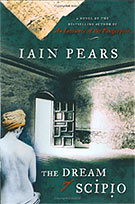« On the Water - Nathaniel Stone | Home | Handling Sin - Michael Malone »
June 13, 2005
The Dream of Scipio - Iain Pears
Iain Pear's The Dream of Scipio follows the lives of 3 men, all men who are deeply thoughtful and philosophical, all who must face terrible decisions which try their deepest beliefs, and all men who lived in France's Provence in three different centuries of great upheaval. Manlius Hippomanus, a wealthy Roman aristocrat, suppresses his own Greek philosophical training to become a Bishop in the mid to late fifth century AD, the period during which the Roman empire is collapsing and Gaul is abandoned to the Visigoths. 900 years later Manlius' writings are studied by Olivier de Noyen, a poet in the service of Cardinal Ceccani, during the brief historical period in which the pope resided in Avignon - the mid 1300s, and during which time the great plague decimated a third of Europe. 600 years later again, Julien Barveuve, a classics scholar unearths de Noyen's writings in the Vatican. Like the men before him, Julien's life is turned upside down as his world collapses during the Nazi invasion of France. Each man is also passionately in love with a powerful woman, and each passion leads to disastrous results.
This intricate novel is not a light summer read. It took me two thirds of the way through it to consistently keep track of who was who and which century we were in. Once the characters were finally established in my brain as to which century, which conflict, and which woman, the novel began to come together. And after finishing it, I picked it up to read it again, this time with more appreciation and less confusion. Once beyond the complexity of juggling three stories simultaneously, the novel became quite interesting, mostly because of the horrendous moral choices each character had to make. In each situation the main character performs a brutal betrayal and endures a great sacrifice to do what he thinks is right. Each has high moral ideals that are compromised by political realities. The fundamental philosophical questions that each has devoted their lives to examining are called to bear in their own lives.
I recommend this novel, but with the following guideline. If you attempt it, remember the centuries of the following characters:
Julien, Julia, Bernard, Marcel - 1930s
Manlius, Sophia, Felix, Syagrius - 5th century AD
Olivier, Rebecca, Gersonides, Ceccani, Clement, Pisano - 1340s
Posted by elise at 6:44 PM
to Historical Fiction
Comments
i am currently reading this, and am really enjoying it, although the plot is amazingly intricate. thanks for your review, it was interesting =]
Posted by: lucy, 14 at May 23, 2008 11:46 PM
